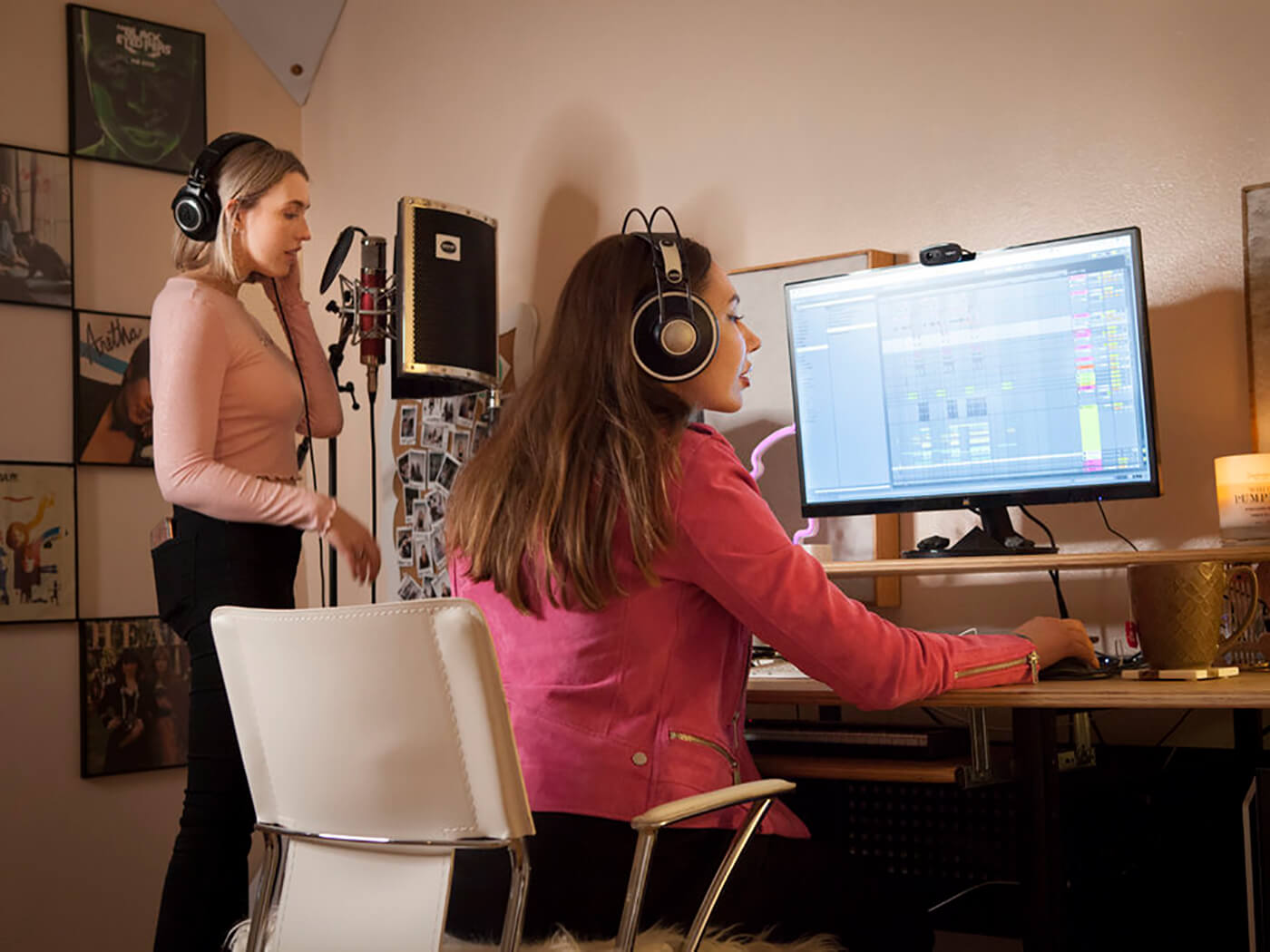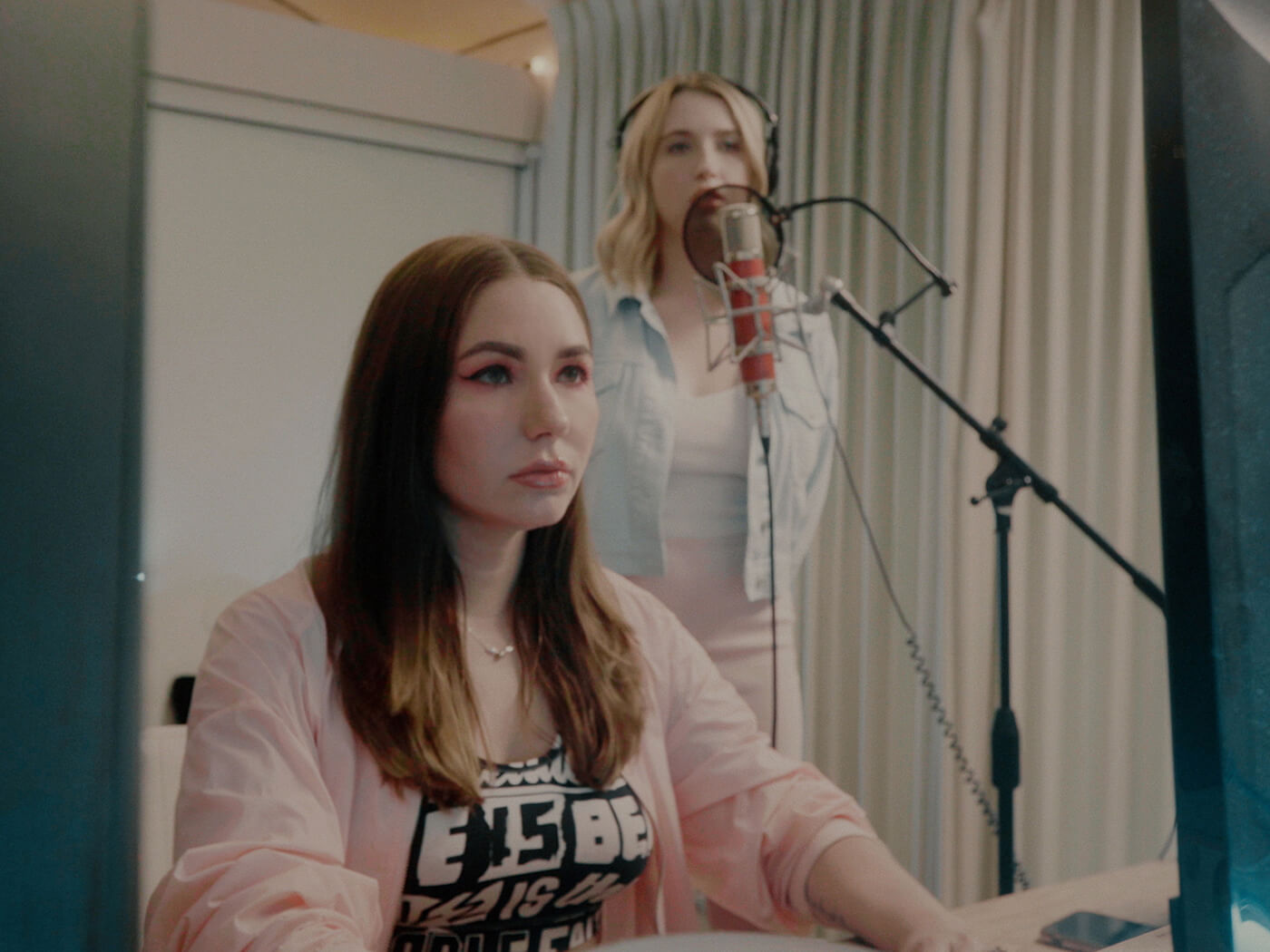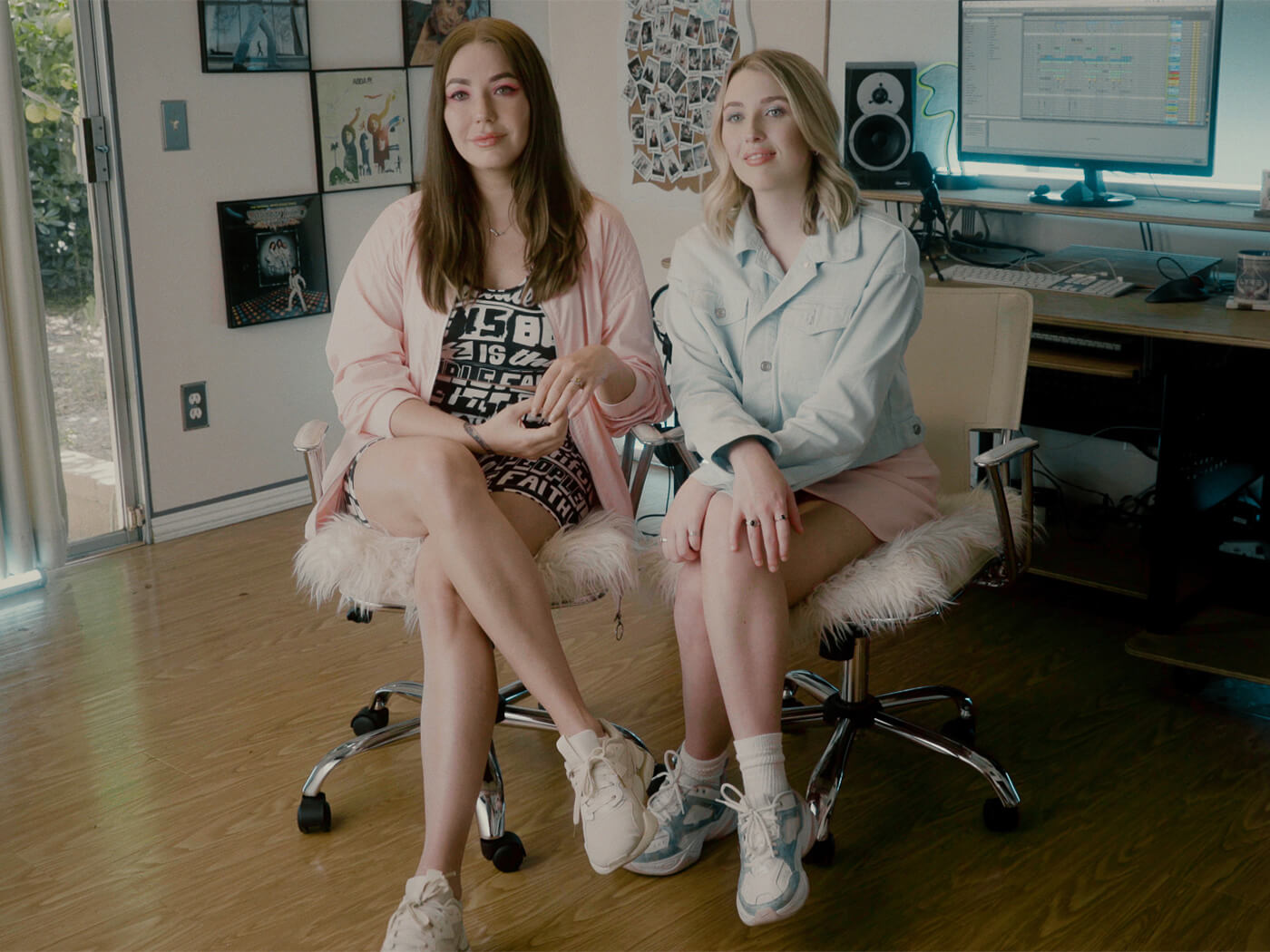Production duo LYRE share vocal chains and explain the power of silence in tracks
Female production and songwriting pair have scored over 100 million plays and they’re just getting started.

Female production duo LYRE may not yet be a household name, but at their current trajectory, they could be before long. Made up of best friends and former roommates Alina Smith and Elli Moore, LYRE specialise in pop and their productions have already racked up over 100 million plays. They’ve even earned the number one spot on iTunes and the Billboard charts.
Raised in Russia – and with a stint in Nashville – Alina tackles the engineering and production side of the process. With a strong leaning towards classic pop, Alina is a strong topliner. Elli, meanwhile, is an artist in her own right, a skilled melodic writer and producer and is even, in an unexpected twist, the singing voice of Barbie an animated show on Netflix.
Their production credits comprise work with artists such as Kirstin of a capella group Pentatonix, Gabbie Hanna and Betty Who as well as other big-name writers Evan Boggart (Rihanna, Beyonce) and Dream Lab (Selena Gomez, Nicki Minaj).
We catch up with Alina and Elli from their Los Angeles studio to talk about studio tools, the power of silence in tracks, and how to stay current.
How did you both get your start in production?
Alina Smith: I was an artist for the majority of my teens and 20s, and I always found it difficult to meet a producer that could fully realise my vision for my project, all those sounds I was hearing in my head that I couldn’t put a name to. Eventually, I realised, that if I wanted the music I was hearing in my head to come to life, I had to produce it myself. So, slowly but surely I started picking up production. I started out on a scratched-up PC laptop with a dynamic microphone plugged directly in and progressed from there.
Elli Moore: My role in LYRE is predominantly songwriting, artist development and vocal production. I sing and have been singing the demos for the songs Alina and I write since we started, so a lot of our vocal sound has been based on that.

What’s the story behind how LYRE was formed?
EM: We became best friends in Nashville, Tennessee because we were roommates by chance. A couple of years into our friendship, we started experimenting with writing different styles, including K-pop, which took a forefront and ended up bringing us out to LA. Once in LA, we switched our focus more to developing US-based artists, which is mostly what LYRE works on at the moment. We have been best friends now for 8 years, and we’re still roommates!
How would you describe your production approach?
AS: I would say, our approach is first and foremost holistic. I never produce a song based solely on how I’m feeling or what inspires me in particular at the moment. Elli and I together always try to consider the artist, their background, the lyrical content of the song, as well as current musical trends. It’s all about finding that balance between commerciality and satisfying the artistic impulses of everyone in the room.
I’d like to think that my production is quite detail-oriented. I try to choose every element deliberately with an eye toward creating a particular feeling. For example, if a song is reminiscent of 90s R&B, I’ll make sure to comb through some samples from the classic TR-808. I might use a classic digital cowbell, for example, but I will run it through a very modern reverb VST to marry the old with the new.
I would also say, that classical orchestration comes pretty naturally to me, as I was raised in Russia on music like Tchaikovsky and Shostakovich. It’s not very often that pop music asks for those skills, but when an artist does seem excited to try some orchestral elements – like in Perfect Day by Gabbie Hanna – I’m always excited to dig deep into my roots.
To what extent do your respective backgrounds in performance inform your approach to production?
EM: I have a big musical theater background, so performing is my bread and butter. When we create a song in the studio, we often cater its dynamics to a live performance, making sure there’s a lot of tension and release in the track. It’s all about understanding how an audience perceives a song and how it affects them, and catering the track to their ears!
What do you think is the key to staying current with production?
AS: I think there are a couple of tricks here. First, listening to new music is key. I definitely have some of my favourites from the 90s and the 2000s, but I make sure I don’t only listen to old jams, but also stay updated on everything that’s coming out, music that’s popular and stuff that’s a little bit more underground.
LYRE provided vocal production on 2017 summer hit Got The Feeling by SYN COLE featuring Kirstin.
Another trick is to keep your library updated with fresh sounds. I’m always sifting through Splice.com, looking for sonic candy that might inspire me. There are so many amazing libraries on there, and every time I go on I find myself downloading something new to use in my next track. Which is one of the reasons we, as LYRE, wanted to create our own sample pack for Splice – it’s really exciting to share some of the sounds we created and watch other producers shape them into something completely brand new.
We notice you use complete silence in productions to dramatic effect. Can you speak to that approach?
EM: Like I mentioned, coming from a musical theatre background, I think, playing to the theatrics of the song is important. Using complete silence stops lets the audience process their feelings and allows them to be ready for the part to come. It also really comes to life in music videos, as that silence can be used for various emotional impacts: to build tension, to creep out the audience, to get them excited!
How do you overcome writer’s block?
EM: Luckily, being in a team we don’t experience this a lot. If one of us is feeling blocked, then the other one can pull from their personal inspiration. Our best advice for getting over writers’ block, if you’re a solo writer, is to be patient with yourself and allow inspiration to come. Go out and live life! Invest yourself fully into experiences – the best art is a reflection of life!
What have been the greatest challenges you’ve faced as producers and songwriters?
AS: In the very beginning of our partnership, we have experienced a few instances where people didn’t understand the vision of our team. Because they have never seen two women come together so harmoniously, they would view us as individual artists first and foremost, rather than as a unit. But because our dedication and loyalty to each other never wavered, eventually everyone around us started understanding and supporting our dynamic.
EM: Which is why you have to believe what you believe in and stick with it. There are a lot of opinions floating around out there, and if you let them be right, they will be. So don’t!
What couldn’t you make music without?
AS: I’m actually super particular about what I have to have in a session, otherwise, it doesn’t flow well for me. I always have to have a desktop microphone right next to me, to quickly record ideas and to record vocal samples, if inspiration strikes. Those seconds wasted going to the main vocal mic dilute the inspiration. I also have a carefully curated library of sounds I’ve created over the years, that really make locking in on a vibe fast and easy. Ableton is amazing for that: I could have something like a Serum, a Fabfilter Pro-Q, Valhalla reverb and H-delay on a channel, quickly group them all and save them as a custom instrument. Having access to my favourites is crucial to me!
Can you talk us through a typical session – what’s your process?
EM: Usually, the thing that comes first in a session is the combination of the idea and the general vibe we’re going for. For example, with Kenzie’s song “HOT”, we knew she wanted to experiment with a more mature sound than what we’ve previously done with her. We also knew she wanted to write about a particular ex-boyfriend. We had an idea called “Just Because You’re Hot” in our note for a while. Alina started playing some moody chords and we began humming the chorus refrain almost right away. The rest of the song followed organically, production filling out around the topline. Since we were songwriters first, our approach is very much to feature the song and have the production serve it as opposed to the other way around.
AS: Every situation is different, but I think the one constant is that we have to have a synth keyboard to write chords on. We have done a few sessions on guitar, but as a piano player first, piano is where I tend to naturally lean. We use an Avantone CV-12 mic for vocals, which is an amazing pop vocal mic for a budget, and we are also huge on UAD interfaces. We have the Apollo X6 in the studio and use a Twin for mobile sessions.
Can you walk us through your vocal chain?
AS: So, the Avantone mic is our staple, and we run the vocal through UAD preamps and several of the UAD hardware emulator plug-ins, like the Neve 1073 EQ and the 1176 compressor. Once the vocals are recorded, I bus them out to an AUX chain, which has a lot of different plugins on it, from a touch of Ozone 8, to UAD Fatso, to CLA Vocals by Waves. I personally love parallel processing, because you get to pull in colours from different plug-ins without overloading the main channel.

Are there any plug-ins that you’ve been using a lot recently?
AS: I’ve been really getting into string arrangement lately, and Spitfire Studio Strings is a really lush library for Kontakt, which I bought recently and have been really happy with. I’ve also recently gotten really into iZotope Nectar for vocal FX and cleanup. And Neutron by iZotope has some of the best mixing presets I’ve seen in a while!
What’s the best piece of advice you’ve ever received?
EM: Don’t compare your journey to somebody else’s. You may be on chapter three, while they’re on chapter 12.
AS: Surround yourself with people that support you for who you are. It’s very easy to get stuck wanting to please somebody else, be it a manager or a collaborator, but ultimately, if you’re not expressing who you are through your art, what’s the point?
What do you know now that you wish you knew when you were starting out in songwriting and production?
EM: I really wish I knew “I feel it in my heart” was not a clever lyric. Haha. Seriously, it takes years to develop the critical thinking skills for songwriting. Is this interesting enough? Does this flow well? Am I pushing myself?
AS: I wish I had known not to work with people I don’t feel inspired by. I had spent years with management I didn’t align with or collaborators I didn’t creatively vibe with, and the truth is, hardly anything good comes out of those relationships. You need to be on the same page with people you work with to feel good about the work that you’re doing and the progress you’re making! Surround yourself with good energy, and good energy will come back to you!
What are your current projects, and what can we expect from LYRE?
AS: So, we actually just released our sample pack with splice.com, so that’s exciting! There’s a good variety of sounds in there, from airy vocals to shimmery synths, to vibrant pop drums.
Also, Elli is an amazing pop artist herself, and we have several exciting releases in the pipeline for her! If you enjoy the Splice pack, you will probably really like her music. A lot of the sounds for the project are self-curated, just like the pack!
EM: You can keep up with us at our official website to see some more of our upcoming releases and amazing artists we work with!
For more interviews with producers, songwriters and engineers, check here.